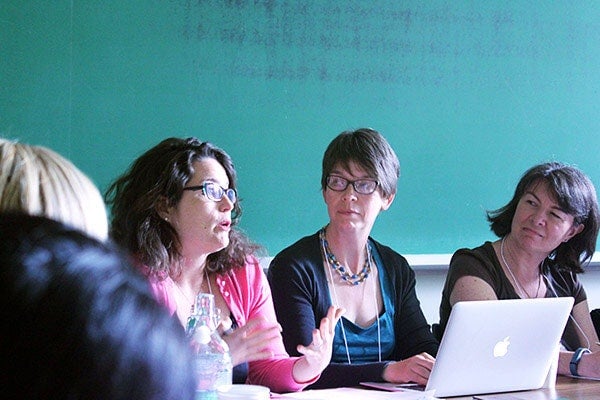
Big Berks at U of T sparks important discussions on history of women
Published: May 29, 2014
“U of T was an ideal place to hold this first internationally located Berks Conference,” said Franca Iacovetta, professor of history at University of Toronto Scarborough and president of the Berkshire Conference. “The university is an internationally recognized university with internationally respected, leading-edge scholars.”
U of T was also one of the first universities in North America to introduce women’s history, thanks to founding women’s history scholars such as Jill Ker Conway and Natalie Zemon Davis (both of whom were honoured at this conference).
And, Iacovetta added, “Toronto is one of the most global, diverse and queer cities in the world.”
In 1930, women historians in the northeastern United States began organizing networking retreats – what has come to be called the “Little Berks” – in response to the professional isolation they experienced. Second-wave feminists of the 1960s and 70s, who were establishing the field of women’s history, launched the “Big Berks.”
Since then, the Big Berks has become the most important conference of its kind in the world, said Iacovetta.
"With this conference, we are continuing in-depth and wide-ranging interdisciplinary research and teaching, archival and museum development, related to women, sexual and racial minorities and other historically marginal or neglected subjects.”
The focus of this year’s conference was Histories on the Edge/Histoires sur la brèche, exploring such issues as war-displaced, immigrant and migrating women; transgressive subjects and the courts; women and psychiatry; reproductive health; and lesbian, gay, bisexual and transgendered (LGBT) histories.
The conference also prioritized the history and experiences of Indigenous women. Lisa Murdock, a program and policy consultant for Aboriginal initiatives in Manitoba, was among the presenters on the topic. Murdock presented her short film, I Am My Mother’s Daughter, which tackles the inter-generational effects of residential school survivors (her mother being one such survivor).
The short feature is part of a project that encourages Aboriginal women to share their experiences through digital storytelling.
“It started with six women, sharing our experiences with our mothers [on film]. And from there, we developed a toolkit for digital storytelling as a therapeutic method for Aboriginal women,” said Murdock.
Other sessions at this year’s Berks conference touched on a vast number of important topics, from human trafficking across the ancient world and beyond, to Islamic feminism; from transnational history of lesbian migration in Australia and North America, to gender issues and the school curriculum in North America.
The next conference will take place in New York City in 2017. But will the Big Berks ever return to U of T?
"Some enthusiastic colleagues said it must return,” said Iacovetta. “Others that it should always be here! Who knows, but U of T has made its mark in Big Berks history.”



